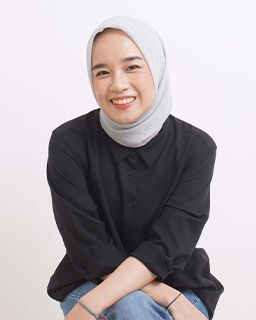Annisa Shabrina Zatalini
Research on humans always leaves a mark on the community... the "do no harm" principle became a significant takeaway from my studies, reminding me that it extends beyond simply avoiding harm, as what is considered good or bad for human communities can be subjective
Fascinated by human behaviour, and driven to make seemingly arbitrary actions more understandable, Annisa Shabrina Zatalini has dedicated her studies to exploring how individuals respond to change. With a Bachelor’s degree in Psychology as her foundation, she is now pursuing a Master of Social Research Methods (Advanced) at the Australian National University (ANU) to, “gain a deeper understanding of the complex social networks that influence human responses to change,” she says. “I believe that humans are inherently social beings, and by combining this degree with my background in Psychology, I aim to gain insights on both individual and collective levels.”
As an international student from Indonesia, Annnisa initially assumed that her background might not be relevant to the course. “Contrary to my initial assumption, the course convenors encouraged me to incorporate my background into my rationale for methods and my writings, promoting inclusivity while maintaining the research's merit and integrity,” she explains. Adding, “The most enjoyable aspect of studying the course was the opportunity to explore various disciplines that each course offered. The spectrum of social research is very broad, and I had the privilege of learning methods I never expected to encounter. These diverse methods could then be applied to different projects within each course, making the learning experience more practical and reflective of real-world scenarios.”
Reflecting on her earlier challenges, Annisa notes, “It’s important to acknowledge the anxieties I experienced during my first month of study as an international student from a developing country. Although it was challenging, I want to remind others in similar situations that you are not alone and that what you are doing is a courageous step. It takes significant bravery to embark on this journey, and that courage should never be underestimated or diminished.”
Her advice to all students extends from her experiences, “Always have an insatiable appetite for learning, as knowledge is limitless and embracing this mindset will drive you to become a lifelong learner – a crucial trait in an aspiring researcher. Be open to exploring different disciplines and methodologies, as understanding diverse perspectives will enhance your ability to conduct more impactful research.”
During her studies, Annisa has gained practical experience working as a Research Assistant at UNSW Canberra, contributing to a project on digital nomadism in Indonesia. “This role allowed me to apply the knowledge and skills I acquired during my course in a practical setting.” Currently, as she writes her thesis on Indonesian diasporas in Canberra, this experience is helping her better understand the shifts in gender roles experienced by these communities after migrating to Australia.
The Master of Social Research Methods (Advanced) has profoundly deepened Annisa's understanding of the intricacies of human behaviour. Reflecting on her leanings, she shares, “I believe that humans are complex, with multiple underlying variables influencing their behaviours. As a researcher focused on studying humans and its society, I have learned to consider this complexity. While I gained knowledge of various social research methods and how to produce high-quality results, one principle profoundly changed my perspective: the principle of "do no harm." Before attending this program, I thought research had little lasting impact on its participants. However, I have since learned that research on humans always leaves a mark on the community. Therefore, the "do no harm" principle became a significant takeaway from my studies, reminding me that it extends beyond simply avoiding harm, as what is considered good or bad for human communities can be subjective and contentious.”
As Annisa works towards improving gender equality in Indonesia throughout her career, she aspires “to effect change incrementally, making a positive impact in each workplace where I contribute. I also aim to develop inclusive practices in policy-making in Indonesia, supporting overall growth and giving back to my country. Ultimately, I hope to build something that will continue to benefit future generations and leave a lasting legacy.”

